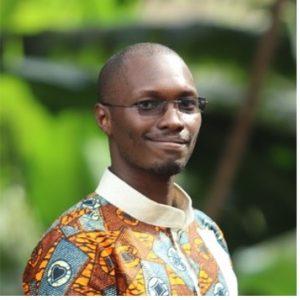 Our immunologist of the month is Simon G. Kimuda, a Post- Doctoral research fellow supported by the Crick African Network based at the Francis Crick Institute, UK and the MRC/UVRI and LSHTM Uganda Research Unit, Uganda. HIs research focuses on understanding humoral immunity against Mycobacterium tuberculosis, and hopes his research will contribute to the development of improved diagnostics and TB vaccines.
Our immunologist of the month is Simon G. Kimuda, a Post- Doctoral research fellow supported by the Crick African Network based at the Francis Crick Institute, UK and the MRC/UVRI and LSHTM Uganda Research Unit, Uganda. HIs research focuses on understanding humoral immunity against Mycobacterium tuberculosis, and hopes his research will contribute to the development of improved diagnostics and TB vaccines.
What is your research background and what led you into the field of immunology? I completed a BSc in Biomedical Laboratory Technology at Makerere University, Uganda in 2011. Shortly after completion of my first degree, I worked as a volunteer laboratory technologist at the National Tuberculosis (TB) Reference Laboratory of Uganda. While there I gained an appreciation of the burden of TB in Uganda, further I realised that the only way to fully understand the infection was to study the immune response as it was an integral part of TB disease pathology. Following, my volunteering “stint” I decided to pursue my MSc in Immunology & Clinical Microbiology at Makerere University. More, specifically I was housed in the MRC/UVRI Uganda Unit and undertook research that focused on understanding TB humoral immunity against latency associated antigens to determine whether they had any value in LTBI diagnosis.
Following successful completion of my MSc, I pursued doctoral studies first at the MRC/UVRI to support these studies, then later moved to the United Kingdom at the London School of Hygiene & Tropical Medicine (LSHTM) after I received the highly prestigious Commonwealth Scholarship Commission (UK DFID). In the final year of my PhD, I won funding from the Immunising Pregnant Women and Infant’s Network and the MRC/UVRI and LSHTM Uganda Unit to test lab-based tools that can be used to predict how well TB vaccines work in Uganda. I was subsequently awarded funding from the Crick African Network to study immune responses in children that are able to resist TB infection, despite being exposed to the disease, in order to advance the development of new vaccines against TB.
How has your research contributed to better understanding your research area? I would like to think that my research has added to the important knowledge of the B cell and antibody response following Mycobacterium tuberculosis (M.tb) infection. The findings from my PhD studies showed that infection with M.tb may have unknown effects on memory B cells recognising unrelated pathogens. This may have implications for future vaccine development. My research also explored the use of alternative samples for serological analyses in the field of TB research. This is very valuable in TB vaccine studies which often target infants from whom only minimal blood volumes can be drawn.
What are your other research interests and why? I am interested in the development of vaccines against infectious diseases that affect humans. These illnesses are still the major cause of deaths in my home country, Uganda. I would like to help develop vaccines that can be used to prevent such deaths.
Apart from your current research area, what other research fields would you like to contribute to in the near future? I recently joined a glycobiology laboratory. It is all very fascinating and it’s a steep learning curve for me. I would like to delve deeper into this subject and merge it with my area of expertise. Hopefully, this may lead to work towards a glyco-conjugate vaccine against TB.
What were your biggest difficulties in your research? Balancing lab work, writing, teaching and project management. This issue uniquely affects African researchers because we are expected to do it all once we have finished our PhDs.
What activities are you involved in outside of your research work? I have had the privilege to be part of a capacity building programme that trains scientist from Eastern and more recently, western Africa. I also have formal and informal mentorship roles. I enjoy listening to students and helping them become their best selves.
What advice do you have for young aspiring immunologists? Pick topics that you enjoy. It is much easier to succeed in something that you love and have passion for. Please be wise in your choice of supervisors and collaborators. They can make or break you. A degree is important but so is your mental health.
Interview by Vanessa Mwebaza Muwanga










